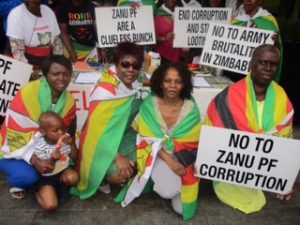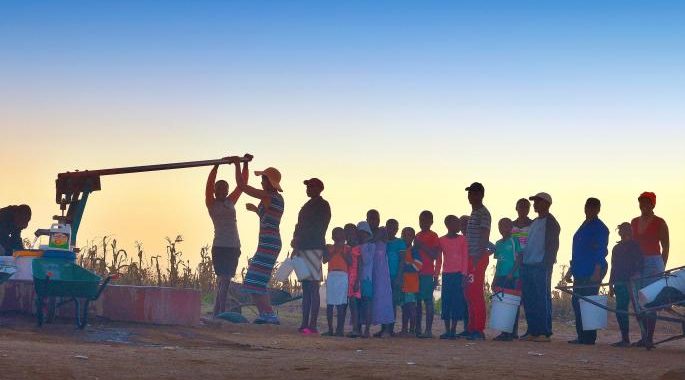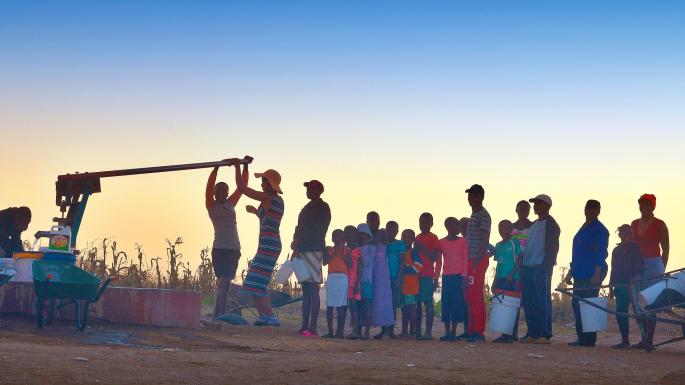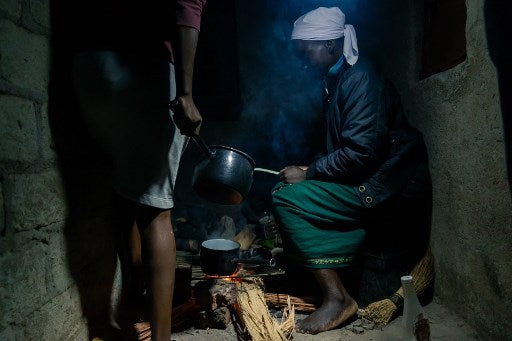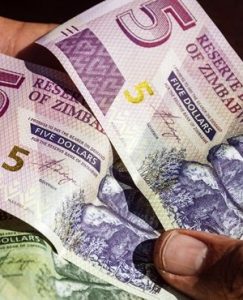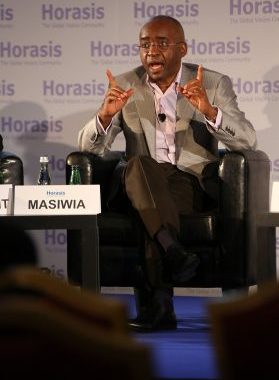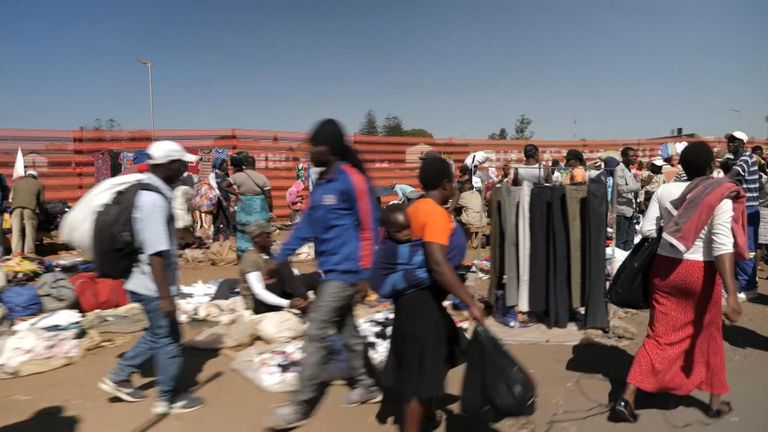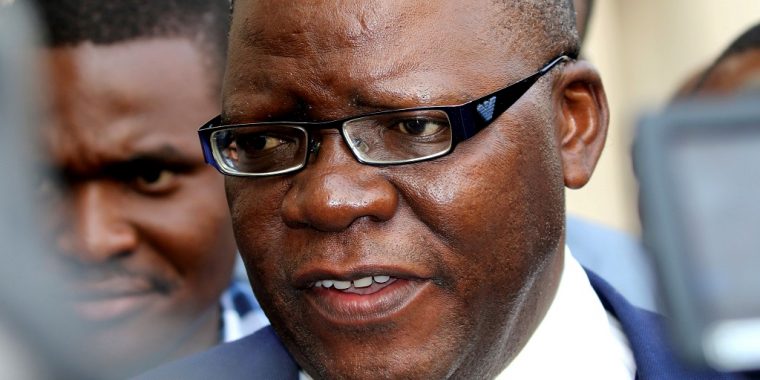Mandy Chimuti looks at the menu board of the small cafe she manages in northern Harare and takes out a black marker. One by one she crosses items out. Coffee: no. Orange juice: no. Cheeseburger: no. Toasted sandwich: no. In the end only salad and homemade lemonade remain.
“No power,” she explains. “Welcome to Zimbabwe. No power, no water, no cash.”
Round the back is a small generator but the queue for diesel is five hours and she doesn’t have the US dollars required. She might have been able to do sandwiches but the country has run out of wheat. So scarce is bread that 500 loaves were stolen in an armed heist last week from a delivery truck in Harare.
Round the back is a small generator but the queue for diesel is five hours and she doesn’t have the
US dollars required. She might have been able to do sandwiches but the country has run out of
wheat. So scarce is bread that 500 loaves were stolen in an armed heist last week from a delivery
truck in Harare.
“We have gone back to olden days,” laughs Chimuti, 43, a single mother with four children.
“I used to have water from a tap; now I have to go to a well with a bucket. I used to switch on the
lights; now I light candles for my kids to do their homework. I used to turn on the heater [it is winter
in Zimbabwe and temperatures drop close to zero at night]; now I use a charcoal burner. I used to
cook on an oven; now I use firewood. We used to have toast for breakfast; now, if we have anything,
it’s a sweet potato.”
Astonishingly, Chimuti is talking about life for an educated working woman in a modern capital,
where you arrive at an airport that has a $150m Chinese-funded extension under construction even
though the national carrier now has only two functioning planes.
Yet when Robert Mugabe was ousted in November 2017 by his generals after 37 years of autocratic
rule, Chimuti celebrated alongside much of the country’s 17m population. “After all we’d been
through, never did I imagine it could be worse,” she said.
But last month inflation hit 98% and prices spiralled so much that a basic margherita pizza in St
Elmo’s cafe was priced at $180 on Friday, while a bottle of cooking oil was on special offer at $26 in
Spar.
For many the last straw came on Monday when the government announced on WhatsApp that it
was scrapping its multicurrency system, banning the use of US dollars and returning to the Zim
dollar, which was ditched in 2008 after inflation soared to 79bn per cent.
The move, officially aimed at ending speculation, came with absolutely no warning, leaving everyone
from businesses to embassies floundering as overnight they found themselves locked out of their US
dollar accounts. Shops and restaurants were forced to set prices in a currency that had yet to exist.
“In 2008 the shops were empty but we had money,” said Chimuti. “Now the shops are full and we
have nothing. This is the worst it has ever been.”
The Zanu-PF MP Justice Mayor Wadyajena with his ‘simply enthralling’ new Lamborghini
She says she should not have been surprised given that the “new dispensation”, as the country’s
rulers term themselves, are the same people who brought Zimbabwe to its knees.
For decades President Emmerson Mnangagwa had been Mugabe’s henchman, involved in some of
his worst atrocities, from the massacre in the 1980s in Matabeleland, in which at least 10,000 died,
to the violent rigging of elections.
However, on taking office he donned a cheerful rainbow knitted scarf, hired an Oxford professor as
finance minister, flew to Davos and declared Zimbabwe “open for business”. He convinced some,
such as the then British ambassador Catriona Laing, that he was a reformed character intent on
rebuilding his country.
Instead, within days of contentious elections last August, the military shot dead six people in the
central business district of Harare in broad daylight. Following protests over the tripling of fuel
prices, a brutal crackdown in January saw at least a dozen people killed and thousands rounded up
and beaten, including teenage girls dragged from their beds.
Primary school teacher Portia Kaya’s salary has shrunk to £1 a day – GRAEME WILLIAMS
With the regime unable to pay the US$87m owed for electricity to South Africa and Mozambique,
power cuts over the past two months have affected residents for 18 hours a day. Electricity comes
on only between 10pm and 4am. At Dandaro Retirement Village, this prompts bizarre scenes in
which elderly residents get up in the middle of the night to do their washing, mow their lawns, and
wash and dry their hair.
The bread shortage is the result of a failure to pay Belarus to release wheat imports from bonded
warehouses, Zimbabwe’s own production having plummeted.
“We used to have a political and economic crisis,” said Peter Mutasa, president of the Zimbabwe
Congress of Trade Unions (ZCTU). “Now we have a humanitarian crisis. The system has created a
whole sea of people living in abject poverty. Workers are literally starving in their houses.”
Yet some people profit from chaos and those with contacts in the ruling elite are doing extremely
well, selling on the black market. MPs do not pay import duty on cars and there is a Jaguar
showroom just down the road from the headquarters of the ruling Zanu-PF party.
Earlier this month Justice Mayor Wadyajena, a Zanu-PF MP and an associate of Mnangagwa, posted
a picture on Twitter of his new yellow Lamborghini. “I’m one hell of a satisfied customer,” he wrote.
“This Super SUV is unbelievable; that primordial roar is simply enthralling.” When someone
questioned how he got the US$210,000 reported by ZimLive to buy the supercar, he replied that it
actually cost double that figure.
This is beyond imagination to Portia Kaya, 42, a primary school teacher, whose salary has shrunk to
£1 a day. She invites me to her home in Glenwood, where she is cooking dinner of a pan of sadza
(cornmeal porridge) on a small fire outside her house. As dusk falls neighbours emerge with bundles
of firewood and hundreds of tiny fires are lit while others queue with buckets at the well for water.
Inside Kaya’s house are an oven, fridge-freezer and television. “We just sit and look at them,” she
laughs as she lights a candle to start her marking.
Cafe manager Mandy Chimuti: ‘This is the worst it has ever been’ – GRAEME WILLIAMS
In the past, after a day teaching a class of 60 six and seven-year-olds, she used to cook for her sister
and baby niece, with whom she shares two rooms. Then she would either study for her master’s or
put her feet up and watch TV. “It wasn’t much of a life but it was a life,” she says. “Now it’s just a
struggle.”
Her monthly salary is RTGS$600 (real-time gross settlement) — a virtual currency, transferred by
phone, an ingenious way for the government to avoid printing money. It was supposed to be worth
2½ to the dollar when introduced in February. However by last week the rate had fallen to 14,
equivalent to £1 a day.
From this she pays RTGS$160 for transport to school, RTGS$120 for rent in a house shared with
three other families and RTGS$100 that she sends to her ageing mother. Every day she pays
RTGS$2½ for a candle and between three and four for firewood. Sugar, washing powder and cooking
oil cost her RTGS$120.
In addition the government imposes a 2% levy on every transaction. She often has to borrow at
exorbitant rates to tide her over to the next month. Most days she leaves for work with no food,
leaving her exhausted while her pupils often faint from hunger.
“Some of my fellow teachers have had to pull their children from school because they can’t afford
the fees,” she said. Others supplement their income by working as prostitutes.
Those with contacts in the ruling Zanu-PF elite are doing extremely well – GRAEME WILLIAMS
“People are dying in their homes because they can’t afford medical care,” said Mutasa, the ZCTU
president. “And these are working men and women. Imagine those who are not.” Only 5.4% of the
workforce hold formal jobs. The rest eke out an existence at the roadside selling a few tomatoes,
sticks for firewood or sitting in the endless fuel queues.
It was apparently a fear of demonstrations and unrest in the barracks among soldiers, whose salaries
have also shrunk in value, that prompted an emergency meeting last weekend between the
president, the finance minister and the state bank governor. After making Monday’s currency
decision, of which even the International Monetary Fund wasn’t told, the last two immediately flew
to China to seek funding. Many believe the move could backfire.
“This is the biggest gamble since the coup,” said Tendai Murisa, who runs Citizens Watch, which
monitors the government.
Both business and unions condemned the move. The ZCTU is raising funds to challenge the move in
court and consulting members about protests such as a stayaway.
But its president knows only too well the dangers he faces. Over the past 18 months Mutasa has
been arrested three times and jailed twice. On Friday evening, after we met, he had to report to the
police because he is on bail accused of subversion of the constitution and inciting public violence,
which carries a sentence of 20 years.
“They are using all instruments of oppression to instil fear in people and specifically targeting
leaders,” he said. “Mugabe would beat and maim you but this new government is shooting people in
the streets.”
Despite the desperate economic situation, the government recently purchased a new arsenal,
including 3,343 AK-47 assault rifles, 600 sniper rifles and 58,500 grenades, posting pictures of them
on Facebook.
“Those ruling us only care about protecting their wealth,” said Mutasa, the trade union leader.
“Violence is the only language they understand. I think we need to fight back to create a base for our
kids even if we die in the process.”
Back at the cafe with only two items on sale, though, Mandy Chimuti is worried. “I guess in most
countries people would rise up, but here we fear what the regime would do,” she said.
“They’ve brought us down to zero — they know that. And if we die for no change, what will happen
to our children then?”


